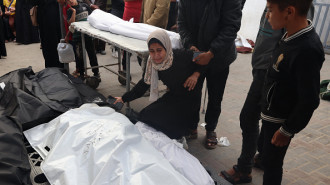Inside Columbia's pro-Palestinian encampment as students warn of more intervention by authorities
Less than two weeks into the pro-Palestinian student encampment protest at Columbia University, the movement has become highly organised, with protocols in place for keeping the protests going while most business goes on as usual.
Upon arriving at the subway stop for the university on Thursday, there is a clear level of elevated security, with yellow police tape and what appears to be additional security measures around campus.
At the same time, on a warm spring day, the street outside the university gate has a farmer's market selling produce and baked goods from upstate, and cafes in the area are seeing steady business.
At the gates, guards check the ID cards of students and alumni, the only ones allowed to enter throughout the day. Several alumni have brought bags of hummus dishes for the student protesters.
One of the guards, himself an alumnus, says that this is unprecedented. For decades, residents of Harlem and Morningside Heights were free to use the university library.
Journalists line up nearby to attend the press hours set daily from 2 to 4 pm. At the gate, their accreditation is checked, and they are then escorted to the main area of the campus where the encampment is located.
The media are not permitted to enter the encampment itself. However, they are directed to an area nearby, where student leaders of the demonstrations hold a briefing in which they emphasise their main demands: divestment, transparency and freedom for detained students.
In the designated media area, there are far more journalists than students. After the briefing wraps up, students speak with small groups of journalists from different outlets.
One student, Jonathan Ben-Menachem, a Jewish PhD candidate in sociology, describes how student protesters held a seder together for Passover, and how Republican House Speaker Mike Johnson acknowledged when he visited campus that he didn't know who was participating.
He noted that many Jewish students were arrested in a sweep by authorities last week.
Ben-Menachem emphasised his and other students' concerns about the possible entry of National Guard troops to campus.
"We're terrified there will be another Kent State or Jackson State," he said, referring to historic instances of state violence against student protesters. "That's the biggest threat." He also expressed concerns about white supremacists and fringe actors outside of campus.
Because of his involvement in the student protest movement, Ben-Menachem says he has received a large amount of hate mail, with many people calling him a "race traitor" for being Jewish and supporting Palestinian human rights.
He says he has now given up on masking or protecting himself due to the doxxing he has experienced over giving one quote to CNN.
Being aware the right-wing, and to some extent mainstream, narrative of the student demonstrations, Ben-Menachem repeatedly emphasised that the protesters are multifaith and diverse.
He also believes that many of the students participating were motivated by the arrests of students and suspensions of student groups by law enforcement and the administration.
When The New Arab asked Ben-Menachem how he felt about other universities taking inspiration from Columbia, he emphasised that he was dismayed at the police crackdowns on some campuses and that he wanted the focus to remain on Gaza, rather than student protesters.
Just then, a man, who declined to fully identify himself or his affiliation, approached Ben-Menachem and said, "They were saying these various other entities were taking inspiration from your work. Did you see the ayatollahs of Iran came out and stood in solidarity with you guys, and I think like a spokesman for Hamas said, 'These are the next generation..."
Ben-Menachem cut him off and said if he wasn't from a news outlet he wouldn't speak with him and then walked away. The man then insisted, without evidence, that some students support Hamas.
Student protesters say that outside agitation has been a major problem, with some instances of people outside the university gates making antisemitic statements that have gone viral, leading to what they argue is a mischaracterisation of their movement.
Across the walkway from the encampment is an installation in support of Israel, with Israeli flags lined up along the lawn and with tributes to hostages held by Hamas.
Later in the afternoon, an Israeli woman who identified herself as Sheila held a microphone and a loudspeaker and urged people to stand with Israel, adding that they "will always be here."
As the day turned to evening, there were more reports of pro-Palestinian encampments at other New York campuses, including New York University and the City University of New York. Not long after, a small encampment appeared at a museum of the Fashion Institute of Technology.
Towards the end of the week, at George Washington University, located downtown in the US capital, another encampment emerged.
This time, when the university administration asked for the police to clear the encampment, the city refused. Possibly taking a cue from the fallout at Columbia, the mayor noted that the protests were peaceful and the optics of using force against them would not be good.
![A pro-Palestinian encampment at Columbia persists, despite recent arrests. [Brooke Anderson/The New Arab]](/sites/default/files/styles/large_16_9/public/2024-04/417084c8-3251-4705-8422-058fca1d5709.jpg?h=ddb1ad0c&itok=dffusjhl)


